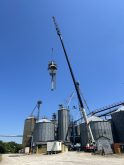COVID-19 should serve as a watershed moment that ushers in an era of nation-wide internet access.
For years, Canadians living in rural areas have complained of poor internet.
These complaints were not entirely ignored, as government’s have made significant investments to improve rural broadband.
But the digital divide still existing today highlights how imperative it is for governments to address the issue.
In a matter of weeks, millions of Canadians started performing their job functions from home. External challenges – like childcare – notwithstanding, this transition was amazingly seamless for many.
Read Also

Ontario’s agri-food sector sets sights on future with Agri-Food 2050 initiative
The first-ever Agri Food 2050, a one-day industry event dedicated to envisioning the future of food and farming in Ontario,…
Home office video chats replaced board room meetings and instant messaging took over for water cooler conversations.
It clearly showed why having a reliable internet connection had been deemed essential by the Canadian Radio-television and Telecommunications Commission (CRTC).
New targets were laid out in 2016, with CRTC challenging service providers to offer customers across the country access to minimum download speeds of at least 50 megabits per second (Mbps) and upload speeds of at least 10 Mbps.
Today, according to CRTC, 85.7 per cent of Canadians have access to those options, but it’s only offered in 40.8 per cent of rural communities.
In plain speak, well over half of the people living in rural communities don’t have access to what the federal government has deemed as the minimum speed target for internet access.
Those statistics were having real impacts before the world moved to conducting pretty much every aspect of life – including socializing – online.
Canadians living in rural communities continue to face hardships resulting from social isolation, and those issues are aggravated by the required social distancing needed to combat COVID-19.
They are also often forced to pay higher prices for internet services less reliable than what Canadians in urban areas are offered.
According to recently released polling from Manitoba’s Keystone Agricultural Producers, almost two thirds of Manitobans surveyed expressed dissatisfaction with their mobile phone and internet coverage.
“With thousands of Manitobans stuck in their homes and relying on internet connections to accomplish important tasks like educating their children, we are all aware that present service levels are unacceptable with daily disruptions,” said Jill Verwey, KAP vice president and chair of the rural policy committee in a press release. “The best time to fix these gaps was five years ago, the second-best time is now.”
In the last federal budget, the federal government committed to ensuring 95 per cent of Canadian homes and businesses have access to the minimum Internet speeds by 2026, and 100 per cent by 2030.
The announcement came with money attached: $1.7 billion over 13 years. Additional money, bringing the total to roughly $6 billion, was also announced to help reach the goal through infrastructure funding and facilitate additional co-ordination with provinces.
COVID-19 should expediate those timelines.
Consider that short and long-term target and its associated cost in the context of spending the federal government has laid out to combat the impacts of the pandemic.
In a matter of days, $27 billion in spending was approved to help Canadians facing hardship as a result of the COVID-19 outbreak.
Understandably, internet access won’t top the list of priorities for many Canadians when outlining how and where they want pandemic response spending to go – but perhaps the 2030 timeline of having 100 per cent access of fast and reliable internet for all Canadians can be expedited.
The short and long-term health of rural Canada depends on it.















